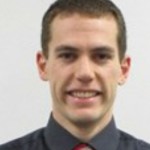 The ME-EM Graduate Seminar speaker on Thursday, November 14th at 4:00 in 103 EERC will be Dr. Steven Elmer from Michigan Tech: Department of Kinesiology and Integrative Physiology.
The ME-EM Graduate Seminar speaker on Thursday, November 14th at 4:00 in 103 EERC will be Dr. Steven Elmer from Michigan Tech: Department of Kinesiology and Integrative Physiology.
The title of his presentation will be ‘Positive Aspects of Negative Work’.
For over 100 years, scientists have been intrigued by the observation that skeletal muscle can produce greater absolute force during active lengthening contractions (“negative work”) compared to active short-ening contractions (“positive work”). In addition to this increased capacity for force production, negative work can be performed at a lower energy cost and with less perceived effort compared to positive work. Taken together, these observations emphasize the high-force, low-cost nature of negative work and sug-gest that exercise training involving negative work could serve as a potent stimulus for improving skeletal muscle function. In this presentation, I will discuss how negative work exercise training has served as an effective method for increasing quadriceps muscle size, strength, and mobility in a variety of populations ranging from patients with chronic disease to older adults to competitive athletes. Subsequently, I will share some preliminary work in which my group has extended the application of negative work to the upper body. Along the way, I will point out some mechanical design and safety challenges that we have encoun-tered while developing the negative work lower and upper body ergometers. By the end of the presenta-tion I hope to convince the audience that if an engineer from department trained for eight weeks using negative work exercise (e.g., 10-30 minutes/session, 3 sessions/week) they would be more powerful than a Tour de France winning cyclist! On that note this presentation will highlight the “positive aspects” of “negative work”.
Steven Elmer is a new Assistant Professor in the Department of Kinesiol-ogy and Integrative Physiology at Michigan Technological University. He completed his doctoral and post-doctoral training at the University of Utah and previously worked at the University of Maine. His research in-terests in health are broad in nature and he uses a cycling model to investigate as-pects of skeletal muscle function and dysfunction. Applications for his research range from basic aspects of neuromuscular function to applied human perfor-mance in a variety of settings including injury, rehabilitation, ergonomics, and sport. As a new member of the Husky Family Dr. Elmer looks forward to devel-oping collaborations across campus.